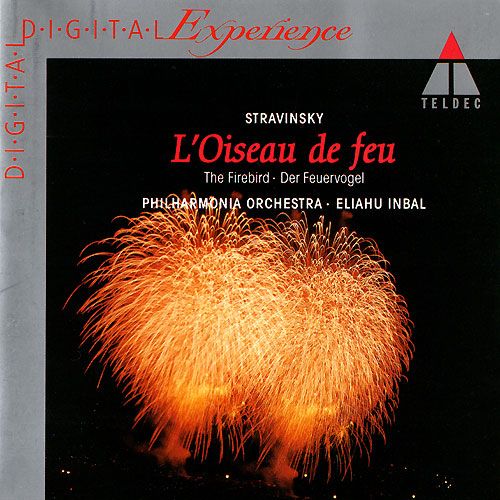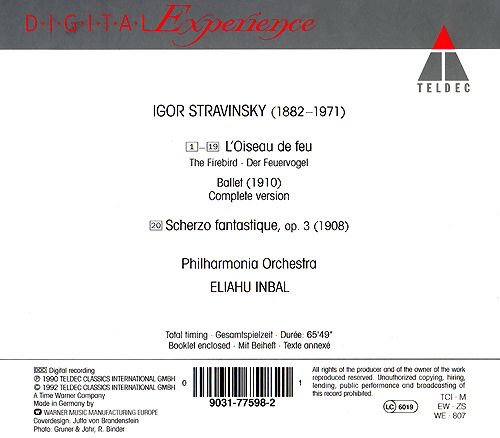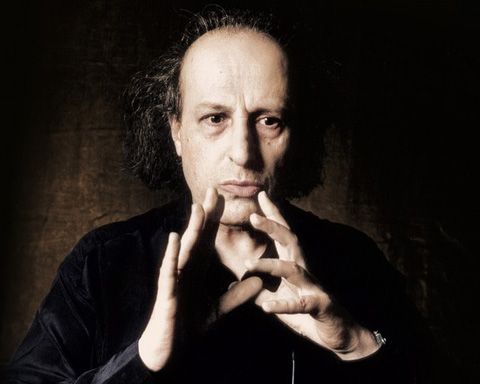wimpel69
11-25-2014, 11:40 AM
EAC-FLAC link below. This is my own rip. Complete artwork,
LOG and CUE files included. Do not share. Buy the original!
Please leave a "Like" or "Thank you" if you enjoyed this!
The Firebird (L'Oiseau de Feu) was Igor Stravinsky's first major success, the first of his ballets to
be premiered by Sergei Diaghilev's famous Ballets Russes. Its fantasy-like story tells of Prince Ivan, who befriends
the Firebird and later summons the magical creature to aid him in defeating the evil magician Kastchei and his
fiendish monsters.
Cast in two scenes and having 22 dance numbers, the ballet opens with the "Introduction," which is dominated
by an ominous, searching ostinato, initially heard in the bass strings. The mood remains dark and mysterious
in the ensuing "Kastchei's Enchanted Garden," but things brighten in the glittering instrumentation that depicts
the appearance of the Firebird and in the "Dance of the Firebird," where you can almost see the creature flit
and flutter. This music corresponds to the second movement in the 1919 Suite No.2, the most popular of the
three the composer extracted from the ballet.
After the Firebird's capture, the music turns dark and fills with yearning as the creature desperately pleads
to Prince Ivan for its release, which he grants, thus gaining its favor. The music in the next four numbers
deals with the enchanted princesses and is light and playful in the first two, reflective and sentimental in
the latter pair.
"Daybreak" is vigorous and colorful, but conveys an ominous sense, a sense that continues when the Prince
enters Kastchei's palace. The next several numbers deal with Kastchei and his retinue of monsters, and
with the capture of the Prince. In these the music becomes threatening and dark, but without ever losing
its fantasy-like character.
The music depicting the Firebird's reappearance to save the Prince again features a colorful, busy character.
The dance of Kastchei's court and the famous Infernal dance follow, the latter a grotesque, rhythmic piece
that many listeners will recognize as comprising the seventh movement of the Suite No.2.
"The Lullaby" follows, featuring an exotic, lonely theme on bassoon. This section serves as the source
music for the eighth movement. The brief "Kastchei Awakens" precedes the most famous music in the
ballet - "Kastchei's Death" -- which also comprises the Suite No.2's finale. It features a soaring, stately
melody -- probably the most familiar theme in any Stravinsky work -- that grows grander and louder as
it proceeds, crowning the ballet with an absolute sense of triumph.

Music Composed by
Igor Stravinsky
Played by
The Philharmonia Orchestra
Conducted by
Eliahu Inbal

"Israeli conductor Eliahu Inbal has become known to many worldwide for both his concert
performances and his numerous recordings, including the complete symphonies of several
composers. In Europe, however, Inbal is nearly as well known as a conductor of opera, with
interests running from the Italian bel cantists through works of the twentieth century. Nor
has he ignored the symphonic works of his own time; a number of important original works
and reconstructions have been premiered under his preparation and direction. Given his
broad repertory, it is not surprising that few of his interpretations may be said to surpass
all others, but his technical control and sensitivity to colors make the majority of his work
highly commendable. Inbal attended Jerusalem University where he studied the violin, but
thereafter he directed his training toward conducting. He participated in conducting classes
led by the legendary and iconoclastic Romanian maestro Sergiu Celibidache at Hilversum
and pursued further courses in conducting at the Paris Conservatoire. In 1963, Inbal's
growing proficiency was recognized when he won the Guido Cantelli Prize at Novara. For
the next two years, the young conductor concentrated his work in Italy, winning appreciative
notices from critics and gaining increasing approval from the Italian public. Inbal's 1965
conducting debut in England, however, came not in the opera house, but in the concert
hall when he led the London Philharmonic Orchestra. His success with the L.P.O. led to
engagements with other English orchestras and to his eventual acquisition of joint British
citizenship. Continuing to balance concert and opera work, Inbal made his debut in
Bologna in 1969, leading a performance of Strauss' Elektra. A production of Verdi's Don
Carlo at Verona the same year added to Inbal's reputation as a conductor able to draw
together the strands of a sometimes-diffuse score. In 1971, he led a concert performance
of Cherubini's Anacr�on, the work's first French-language hearing since 1803, the year
of its premiere. In 1984, Inbal was appointed chief conductor at the Teatro la Fenice in
Venice, remaining in that position until 1989. Undertaking an unusually stressful
assignment in 1986, Inbal conducted productions of two Verdi operas, Stiffelio and Aroldo,
on the same day, receiving acclaim for the orchestral performance despite indifferent
singing from the casts. Meanwhile, Inbal's other life proceeded apace with his engagement
as chief conductor of the Frankfurt Radio Symphony Orchestra, the ensemble with which
he would make a noteworthy series of recordings. Inbal remained at that post until 1990
and in 1996 was named the orchestra's conductor laureate. Presiding over several world
premieres, Inbal received particular recognition for his performance of Juan Allende-Blin's
edition of Debussy's uncompleted La ch�te de la maison Usher given in 1977. That same
year saw the first performance of Xavier Benguerel's Concerto for percussion. In 1982,
Inbal presented the premiere of Isang Yun's first violin concerto. Among Inbal's
achievements in the recording studio are the complete symphonies of Mahler, Bruckner,
and Shostakovich, as well as releases of the complete orchestral works of Ravel, Scriabin,
Schumann, and Berlioz. A recording of Donizetti's Maria de Rudenz issued on Mondo
Musica is distinguished by the conductor's grasp of the composer's transitional style.
In 1990, Inbal was honored with the French Ordre des Arts et des Lettres and in 1996
he was made an honorary member of Italy's Orchestra Sinfonica Nazionale della RAI."

Download Link - https://mega.co.nz/#!WF500bbA!ngzN1h2qQlxrL8vjoVQSpQxihAP8Gcl7XkJEfhg NsGg
Source: Teldec CD, 1990 (my rip!)
Format: FLAC(RAR), DDD Stereo, Level: -5
File Size: 271 MB (incl. artwork, booklet, log & cue)
Enjoy! Don't share! Buy the origina! Please leave a "Like" or "Thank you" if you enjoyed this! :)
LOG and CUE files included. Do not share. Buy the original!
Please leave a "Like" or "Thank you" if you enjoyed this!
The Firebird (L'Oiseau de Feu) was Igor Stravinsky's first major success, the first of his ballets to
be premiered by Sergei Diaghilev's famous Ballets Russes. Its fantasy-like story tells of Prince Ivan, who befriends
the Firebird and later summons the magical creature to aid him in defeating the evil magician Kastchei and his
fiendish monsters.
Cast in two scenes and having 22 dance numbers, the ballet opens with the "Introduction," which is dominated
by an ominous, searching ostinato, initially heard in the bass strings. The mood remains dark and mysterious
in the ensuing "Kastchei's Enchanted Garden," but things brighten in the glittering instrumentation that depicts
the appearance of the Firebird and in the "Dance of the Firebird," where you can almost see the creature flit
and flutter. This music corresponds to the second movement in the 1919 Suite No.2, the most popular of the
three the composer extracted from the ballet.
After the Firebird's capture, the music turns dark and fills with yearning as the creature desperately pleads
to Prince Ivan for its release, which he grants, thus gaining its favor. The music in the next four numbers
deals with the enchanted princesses and is light and playful in the first two, reflective and sentimental in
the latter pair.
"Daybreak" is vigorous and colorful, but conveys an ominous sense, a sense that continues when the Prince
enters Kastchei's palace. The next several numbers deal with Kastchei and his retinue of monsters, and
with the capture of the Prince. In these the music becomes threatening and dark, but without ever losing
its fantasy-like character.
The music depicting the Firebird's reappearance to save the Prince again features a colorful, busy character.
The dance of Kastchei's court and the famous Infernal dance follow, the latter a grotesque, rhythmic piece
that many listeners will recognize as comprising the seventh movement of the Suite No.2.
"The Lullaby" follows, featuring an exotic, lonely theme on bassoon. This section serves as the source
music for the eighth movement. The brief "Kastchei Awakens" precedes the most famous music in the
ballet - "Kastchei's Death" -- which also comprises the Suite No.2's finale. It features a soaring, stately
melody -- probably the most familiar theme in any Stravinsky work -- that grows grander and louder as
it proceeds, crowning the ballet with an absolute sense of triumph.

Music Composed by
Igor Stravinsky
Played by
The Philharmonia Orchestra
Conducted by
Eliahu Inbal

"Israeli conductor Eliahu Inbal has become known to many worldwide for both his concert
performances and his numerous recordings, including the complete symphonies of several
composers. In Europe, however, Inbal is nearly as well known as a conductor of opera, with
interests running from the Italian bel cantists through works of the twentieth century. Nor
has he ignored the symphonic works of his own time; a number of important original works
and reconstructions have been premiered under his preparation and direction. Given his
broad repertory, it is not surprising that few of his interpretations may be said to surpass
all others, but his technical control and sensitivity to colors make the majority of his work
highly commendable. Inbal attended Jerusalem University where he studied the violin, but
thereafter he directed his training toward conducting. He participated in conducting classes
led by the legendary and iconoclastic Romanian maestro Sergiu Celibidache at Hilversum
and pursued further courses in conducting at the Paris Conservatoire. In 1963, Inbal's
growing proficiency was recognized when he won the Guido Cantelli Prize at Novara. For
the next two years, the young conductor concentrated his work in Italy, winning appreciative
notices from critics and gaining increasing approval from the Italian public. Inbal's 1965
conducting debut in England, however, came not in the opera house, but in the concert
hall when he led the London Philharmonic Orchestra. His success with the L.P.O. led to
engagements with other English orchestras and to his eventual acquisition of joint British
citizenship. Continuing to balance concert and opera work, Inbal made his debut in
Bologna in 1969, leading a performance of Strauss' Elektra. A production of Verdi's Don
Carlo at Verona the same year added to Inbal's reputation as a conductor able to draw
together the strands of a sometimes-diffuse score. In 1971, he led a concert performance
of Cherubini's Anacr�on, the work's first French-language hearing since 1803, the year
of its premiere. In 1984, Inbal was appointed chief conductor at the Teatro la Fenice in
Venice, remaining in that position until 1989. Undertaking an unusually stressful
assignment in 1986, Inbal conducted productions of two Verdi operas, Stiffelio and Aroldo,
on the same day, receiving acclaim for the orchestral performance despite indifferent
singing from the casts. Meanwhile, Inbal's other life proceeded apace with his engagement
as chief conductor of the Frankfurt Radio Symphony Orchestra, the ensemble with which
he would make a noteworthy series of recordings. Inbal remained at that post until 1990
and in 1996 was named the orchestra's conductor laureate. Presiding over several world
premieres, Inbal received particular recognition for his performance of Juan Allende-Blin's
edition of Debussy's uncompleted La ch�te de la maison Usher given in 1977. That same
year saw the first performance of Xavier Benguerel's Concerto for percussion. In 1982,
Inbal presented the premiere of Isang Yun's first violin concerto. Among Inbal's
achievements in the recording studio are the complete symphonies of Mahler, Bruckner,
and Shostakovich, as well as releases of the complete orchestral works of Ravel, Scriabin,
Schumann, and Berlioz. A recording of Donizetti's Maria de Rudenz issued on Mondo
Musica is distinguished by the conductor's grasp of the composer's transitional style.
In 1990, Inbal was honored with the French Ordre des Arts et des Lettres and in 1996
he was made an honorary member of Italy's Orchestra Sinfonica Nazionale della RAI."

Download Link - https://mega.co.nz/#!WF500bbA!ngzN1h2qQlxrL8vjoVQSpQxihAP8Gcl7XkJEfhg NsGg
Source: Teldec CD, 1990 (my rip!)
Format: FLAC(RAR), DDD Stereo, Level: -5
File Size: 271 MB (incl. artwork, booklet, log & cue)
Enjoy! Don't share! Buy the origina! Please leave a "Like" or "Thank you" if you enjoyed this! :)